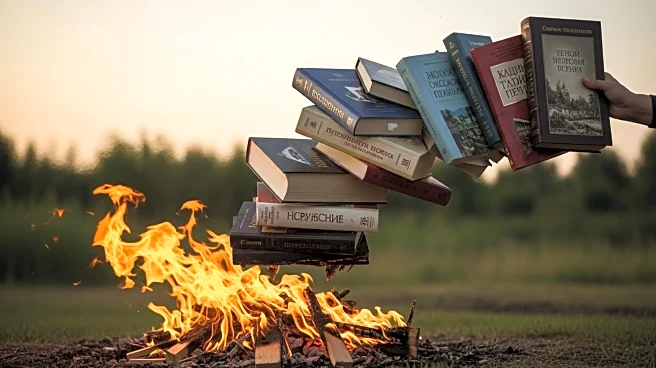What's Happening?
In Ukraine, a cultural shift is occurring as citizens and artists are discarding Russian-language books in response to the ongoing conflict with Russia. This movement is part of a broader effort to 'decolonize' from Russian cultural influence, which has been prevalent for centuries. The invasion of Ukraine by Russia in 2022 has intensified the perception of Russian literature as a symbol of imperial ideology. Statues of Russian writers like Alexander Pushkin have been dismantled, and streets named after them have been renamed. Ukrainian artist Stanislav Turina exemplifies this shift by burning his Russian books, including works by Pushkin, as a symbolic act. Others, like Mariana Matveichuk, have recycled their Russian books, while some bookstores offer discounts for trading in Russian titles. This cultural transformation reflects a growing preference for Ukrainian language and literature, especially among younger generations.
Why It's Important?
The discarding of Russian-language books in Ukraine signifies a profound cultural and political shift. It highlights the impact of the war on national identity and the desire to break free from Russian influence. This movement could lead to a stronger emphasis on Ukrainian language and culture, affecting educational and literary landscapes. The shift may also influence international perceptions of Ukraine, as it distances itself from Russian cultural ties. For the publishing industry, this could mean increased demand for Ukrainian translations and original works, potentially boosting local authors and publishers. However, it also raises concerns about cultural preservation and the implications of removing Russian literature from public discourse.
What's Next?
As Ukraine continues to navigate its cultural identity amid conflict, further actions may be taken to promote Ukrainian language and literature. This could include government policies supporting Ukrainian authors and restricting Russian publications. The educational system might see changes in curriculum to emphasize Ukrainian works. Additionally, international support for Ukrainian cultural initiatives could grow, fostering global recognition of Ukrainian literature. The ongoing war will likely continue to influence these cultural dynamics, with potential reactions from Russian cultural institutions and authors.
Beyond the Headlines
The movement to discard Russian-language books in Ukraine raises ethical and cultural questions about censorship and historical preservation. While some view it as a necessary step to assert national identity, others caution against the erasure of cultural history. The act of burning or recycling books can evoke memories of authoritarian regimes, prompting debates on the balance between cultural autonomy and historical acknowledgment. Long-term, this shift could redefine Ukraine's cultural landscape, influencing future generations' perceptions of Russian literature and its role in Ukrainian history.












